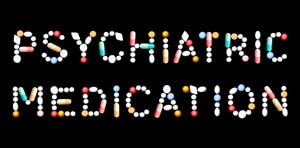
May 18, 2015
More Bad News For Psychotropic Meds
By Michael D. Shaw
A few years ago, this column discussed certain disturbing findings regarding psychiatry and its relationship with the pharmaceutical industry: The major psychoactive drugs are no better than placebos; the “chemical imbalance” theory of mental illness is mostly nonsense; and psychoactive drugs are being given to children as young as two.
The first finding was buried in clinical trials of antidepressants, in which side effects of real drugs (such as dry mouth) could be emulated in an otherwise non-active agent (aka removing “unblinding bias”). In these cases, there was absolutely no difference in efficacy between the antidepressant and the placebo.
As if that weren’t bad enough, Professor Peter C Gøtzsche, director of the Nordic Cochrane Centre—Copenhagen, ups the ante considerably in a recent Maudsley Debate, sponsored by King’s College London. Before presenting Gøtzsche’s stunning pull quote from the debate, it should be noted that he is hardly some wild-eyed anti-drug/anti-psychiatry fanatic. In fact, he is regarded as one of the world’s leading experts in clinical trials of these meds, and even his most ardent foes acknowledge this.
The Cochrane Collaboration—founded in 1993—promotes evidence-informed health decision-making by producing high quality, relevant, accessible systematic reviews, and other synthesized research evidence.
Here is the topic addressed in the debate: Does long term use of psychiatric drugs cause more harm than good? Gøtzsche’s devastating quote…
Given their lack of benefit, I estimate we could stop almost all psychotropic drugs without causing harm—by dropping all antidepressants, ADHD drugs, and dementia drugs (as the small effects are probably the result of unblinding bias) and using only a fraction of the antipsychotics and benzodiazepines we currently use. This would lead to healthier and more long lived populations. Because psychotropic drugs are immensely harmful when used long term, they should almost exclusively be used in acute situations and always with a firm plan for tapering off, which can be difficult for many patients.
Then there is the little matter of mortality. Gøtzsche maintains that under-reporting of deaths in industry funded trials is a major flaw, and supports this by citing a large FDA meta-analysis. From this, he estimates that there are likely 15 times more suicides among people taking antidepressants than reported by the FDA. One reason is that the FDA only tracked such events for 24 hours after patients stopped taking the drugs. How convenient.
Gøtzsche also references a BMJ paper entitled “Antidepressant use and risk of adverse outcomes in older people: population based cohort study.” A key finding is that for this cohort of people over 65, all cause mortality was 3.6% higher when they were taking the newer antidepressants for one year, than when they did not take antidepressants.
Gøtzsche used Danish prescription statistics to estimate the number of deaths caused by three classes of psychotropic drugs. Noting that falls—more common in older folks—are an important cause of death in people taking psychotropic drugs, he applied conservative death rates to the over 65 cohort: 1% for antipsychotics; 1% for benzodiazepines and similar drugs; and 2% for antidepressants. The total number of deaths a year in Denmark (3693) when scaled up corresponded to 539,000 in the United States and European Union combined.
As to the supposed benefits of these drugs, besides the inadequate blinding in the studies, Gøtzsche describes a “cold turkey” effect whereby patients are randomized to placebo, but experience withdrawal symptoms that can be mistaken for renewed anxiety, schizophrenia, or depression. In effect, the benefits of treatment and harm in the placebo group are exaggerated.
The “NO” side was led by Professor Allan Young of King’s College. He attests no share holdings in pharmaceutical companies, but has received substantial funding from all major pharmaceutical companies with drugs used in affective and related disorders. Perhaps, the debate organizers should have chosen someone with less baggage, and more ability to think outside the box.
Young’s arguments were little more than the standard Big Pharma talking points: When you’re dealing with sick people bad stuff can happen; psych drugs are no worse than other drugs; there is a massive regulatory apparatus in place monitoring safety and effectiveness; and our clinical trials aren’t perfect, but we’re only human.
After the debate, a vote of the audience was taken, and the YES side won by more than a 2:1 landslide.
Here’s a final quote from Gøtzsche, taken from one of his books, lamenting that prescription drugs are the third leading cause of death after heart disease and cancer:
The main reason we take so many drugs is that drug companies don’t sell drugs, they sell lies about drugs. This is what makes drugs so different from anything else in life…Virtually everything we know about drugs is what the companies have chosen to tell us and our doctors…the reason patients trust their medicine is that they extrapolate the trust they have in their doctors into the medicines they prescribe. The patients don’t realize that, although their doctors may know a lot about diseases and human physiology and psychology, they know very, very little about drugs that hasn’t been carefully concocted and dressed up by the drug industry.
